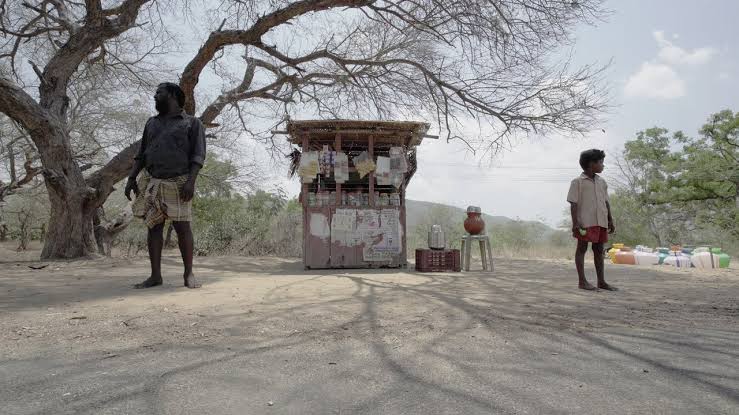
Pebbles (Titled as Koozhangal in Tamil) came into the limelight by securing the Tiger Award for best film, at the 50th International Film Festival Rotterdam (IFFR). Directed by Vinothraj P.S, The film revolves around a day of a father and small school-going son, settled in a draught ridden landscape of rural Tamil Nadu. The film, engaging with the audience through the plot, with breathtaking performance from the lead characters, presents a hooking experience throughout. The performance of the lead actor is admirable, especially at certain moments of emotional uncertainty, where the audience can witness the openings of weakness in his expression while he is concealing all his vulnerability to himself throughout the plot.
The parched, drought-ridden territories of rural Tamil Nadu claims a seminal share in the moving images of the cinema. Apart from that, the possibilities of any interaction in the movie, whether it’s in the bus, or in the wife’s house or even with the father and son, ends up in violence. The violence in the leading character doesn’t have any trajectories in the plot. Rather, it’s shown as an inherent element underlying in the everyday life of Ganapathy (his screen name), which is another important aspect to look upon. The ‘realistic representation’ of a rat-eating family with all it’s savageness is another crucial element in the plot to look further. The non-trajectories of violence, savagery or uncivilized-ness in the movie, which is represented as something inherent with the natives, not presented in an exotic manner though, goes well along with the unknown, parched geographical setting.
The writing here, even if it tries to critically evaluate the aesthetic geography of the cinema since the very domain creates a specific meaning for a larger constituency, especially those who’re in the festival circuits, unfamiliar to the vernacular geographies, it desires to deal with the very question of representation. Since this is not a question which can be answered in detail in a film review, it hopes to leave certain questions in your mind about the limits and politics of representation. The representation here connotes the representation of India in the west in large, and international festival circuits to be specific. It was not so long that the malayalam movie ‘Jellikkettu’, directed by Lijo Jose Pellissery was nominated to the academy awards. The film, which invoked certain debates about the very ‘representability’ of the film since it involves uncontrolled manifestations of violence and savagery. Pebbles is not another Jellikkettu. There are no moments of manifest violence or non-limited savagery. Rather, we can see moments of conflicting emotions along with the structural manifestations of (ab)use of power, unsurprisingly from the father figure, the patriarch.
But there’s a line, if extended, in which both Jellikkettu and Pebbles will meet. That’s the line of (re)presentation and the trope of orientalist imaginations. Knowingly or unknowingly, both the works fell into the trap of binaries created as a result of the long epistemological colonization ie. the binaries of the civilized west/uncivilized orient, peace-loving west/violent-savage orient and the rational west/sensual-emotional orient. Such cues are intentionally or unintentionally placed at the crux of the cinema where a direct confrontation of the civilized, peace-loving, rational west doesn’t occur inside the screen- but just outside the ‘cinematic’, ie. as audiences in the western festival circuits. It serves the duty of providing the very audience a sense of relief, a moment for cathartic pleasure release and finally, a gaze of benevolence. The constant and continuous acceptance for eastern/third world cinema in such spaces should be viewed not only in an admirable way but in a critical/sceptical way also since these accepted/celebrated films maintain a particular aesthetic grammar and an (un)conscious visual orientalism.
The renowned Slovenian philosopher Slavoj Zizek, in a different context, articulates the violence behind the representation-al desires of the west and the need to break that predictability. In his book The Metastases of Enjoyment: Six Essays on Women and Causality, Žižek writes in the introduction to the book about a personal experience:
In autumn 1992, after I had delivered a lecture on Hitchcock at an American campus, a member of the public asked me indignantly: How can you talk about such a trifling subject when your ex-country [ex-Yugoslavia] is dying in flames? My answer was: How is that you in the USA can talk about Hitchcock (emphasis in the original)? There is nothing traumatic in me behaving as befits a victim and testifying to the horrible events in my country—such behaviour cannot but arouse compassion and a false feeling of guilt that is the negative of a narcissistic satisfaction—that is, of my audience’s awareness that they are all right while things are going badly for me (emphasis added). But I violate a silent prohibition the moment I start to behave like them and talk about Hitchcock, not about the horrors of war in ex-Yugoslavia… (Žižek, 1994, p. 2).
The need of the hour is to master that very moment of violation by breaking the dominant conceptions and representation-wise prohibitions of the western hegemony by creating new, liberated, burden-less visual grammar and style. The aesthetic quality of the works from the so-called ‘third world’ often breaks such predetermined notions, though they often fall into the political trap of the existing order. The cinema of Elia Suleiman is an example of bringing the political and the aesthetic together and violating the pre-existing western/oppressive/hegemonic imaginations and convictions in style. Thus, the question of representation should be acknowledged, absorbed and articulated by the creative, talented directors from spaces like India in order to visualise a liberated, burden-less creative articulation devoid of western political-aesthetic demands and settings.
Afeef Ahmed is a student of English literature at Hindu College University Of Delhi.



